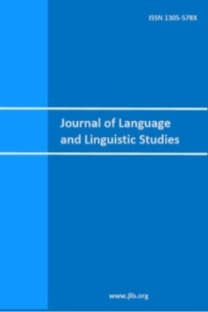Long term effects of intercultural competence development training for study-abroad adjustment and global communication
Öz
This study investigates the long term contribution of intercultural competence development training for global communication and adjustment given to Turkish study-abroad students prior to their sojourns to English L1 countries, indicating their views on how they benefited from the instruction after their arrival in the host country, to what extent the instruction contributed to their adjustment process, and what suggestions they would make for the improvement of the program they had undertaken. Being the last of the three consecutive studies, it is based on e-mail interview responses of eight graduate sojourners whose opinions on the program prior to their departure were reported earlier. The study focuses on the participants’ views on the significance of intercultural competence training and awareness of the nature of English as a means of global communication, and demonstrates the long-terms gains that could be attributed to study-abroad students through an intercultural development course that could best serve for their communication and adjustment needs in the host country.
Anahtar Kelimeler:
intercultural competence; English as a lingua franca (ELF); intercultural sensitivity; global citizenship
___
Barnlund, D., & Nomura, N. (1985). Decentering, convergence and cross-cultural understanding. In L. Samovar & R. Porter (Eds.), Intercultural communication: A reader (4th ed., pp. 347-366). Belmont, CA: Wadsworth.Barret, M., M. Byram, I. Lázár, P. Mompoint-Gaillard, and S. Philippou. (2014). Developing Intercultural Competence through Education. Council of Europe Publishing: Strasburg, BelgiumISBN 978‑92‑871‑7745‑2
Bennett, J. M. (1993). Toward ethnorelativism: A developmental model of intercultural sensitivity. In R. M. Paige (Ed.), Education for the intercultural experience (pp. 21-71).
Chen, G. M., & Starosta, W. J. (2000). The development and validation of the intercultural sensitivity scale. Human Communication, 3, 2-14.
Deardorff, D. (2006). ‘Identification and Assessment of Intercultural Competence as a Student Outcome of Internationalization', Journal of Studies in International Education, vol. 10, no. 3, pp. 241-266.
Fantini, A. E. (2006). Exploring and assessing intercultural competence. Retrieved 27 March 2013, from http://www.sit.edu.
Gnutzmann, C. (2000). Lingua franca. In M. Byram (Ed.) The Routledge Encyclopedia of Language Teaching and Learning. London: Routledge. 356-359.
Hoskins, B. & Crick, R. D. (2010). “Competences for Learning to Learn and Active Citizenship: different currencies or two sides of the same coin?” European Journal of Education, 45: 121–137.
Hymes, D. (1972). On communicative competence. In C. Brumfit & K. Johnson (Eds.), 1979. The communicative approach to language teaching. Oxford: Oxford University Press.
Hülmbauer, C., Böhringer, H., & Seidlhofer, B. (2008). Introducing English as a lingua franca (ELF): Precursor and partner in intercultural communication. Synergies Europe 3, 25-36.
Klak, T., & Martin, P. (2003). Do university-sponsored international cultural events help students to appreciate “differences.” International Journal of Intercultural Relations, 27,445-465.
Kural, F. & Bayyurt, Y. (2016). The implementation of an intercultural competence syllabus to prepare study-abroad students for global communication. Educational Studies, DOI: 10.1080/03055698.2016.1195720.
Kural, F. & Bayyurt, Y. (2017). Interculturality of graduate Turkish sojourners to English L1 Countries. In International Education Exchanges and Intercultural Understanding: Promoting Peace and Global Relations. Palgrave Macmillan, 157 – 171. ISBN:978-3-319-43828-3.
Nunn, R. (2005). Competence and teaching English as an international language. Asian EFL Journal, 3(7), 61-74.
Vande Berg, M., and Paige, R. M. (2009). “The Evolution of Intercultural Competence in U.S. Study Abroad.” In D. K. Deardorff (Ed.), The SAGE Handbook of Intercultural Competence. Thousand Oaks, Calif.: Sage.
Vygotsky, L. S. (1978). Mind in Society: The Development of Higher Psychological Processes. M. Cole, V. John-Steiner, S. Scribner, & E. Souberman (Eds.). Cambridge, MA: Harvard University Press.
Widdowson, H. G. (1994). “The ownership of English”. TESOL Quarterly, no 28, pp. 377-389.
Zhao, C. M. (2002). Intercultural competence: A quantitative study of significance of intercultural competence and the influence of college experiences on students’intercultural competence development. (Unpublished doctoral dissertation). Virginia Polytechnic Institute and State University, Blacksburg, VA.
- ISSN: 1305-578X
- Yayın Aralığı: Yılda 4 Sayı
- Yayıncı: Hacettepe Üniversitesi
Sayıdaki Diğer Makaleler
Bronfenbrenner's theory and teaching intervention: The case of student with intellectual disability
Nikolaos PANOPOULOS, Maria DROSSİNOU-KOREA
Difficulties of students in Process Writing Approach
Comparison of student attitudes towards printed and digital dictionary use: A case of middle school
The needs of adult immigrants in Europe for social inclusion through language education
A study on the punctuation knowledge levels of freshmen students
